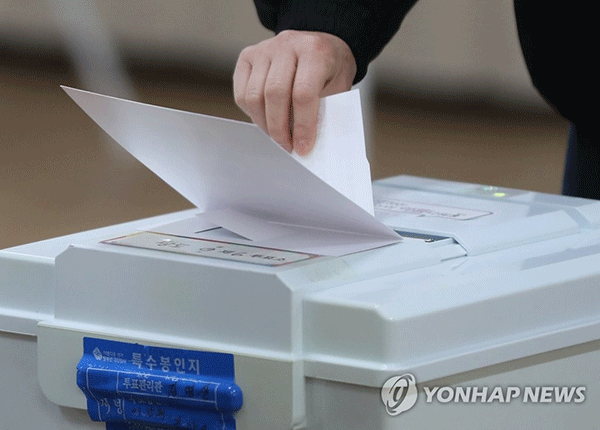The main opposition Liberty Korea Party (LKP) and the leftist Justice Party each won one parliamentary seat in Wednesday's by-elections, in what could be a barometer of public sentiment ahead of next year's general elections.
The elections were held to pick two lawmakers and three local councilors in three provinces, including South Gyeongsang Province in the country's southeastern region.

Voter turnout in the by-elections as a whole reached 48 percent, according to the election watchdog. The turnout for parliamentary elections came to 51.2 percent.
The elections were seen as a litmus test of voter sentiment ahead of the nationwide parliamentary balloting slated for April 2020.
They were also effectively a battle between the liberal and conservative blocs to seek to take the initiative ahead of next year's elections.
The main focus was on two parliamentary seats up for grabs in districts of South Gyeongsang Province -- the industrial city of Changwon, 400 kilometers southeast of Seoul, and Tongyeong-Goseong, 450 km southeast of the capital.
Yeo Young-guk of the minor Justice Party won in Changwon by a narrow margin after the party and the ruling Democratic Party (DP) merged their candidacies to muster liberal votes last week.
He won 45.75 percent of the vote, compared with 45.21 percent for his key rival, Kang Ki-youn. The minor party's seat will rise to six.
Jeong Jeom-sig of the LKP secured the seat with 59.5 percent of the vote in Tongyeong-Goseong. The conservative party's parliamentary seats will rise to 114.
Liberal politicians have received strong voter support in Changwon, as liberal candidates have been selected in three of the four general elections since 2004. Conservative contenders have held firm in Tongyeong on the southeast coast.
In the by-elections, the DP failed to add a parliamentary seat to its current 128 posts. But it could get the Justice Party's backing in its drive to pass a set of reform bills in the third year of Moon Jae-in's presidency.
"Accepting voter sentiment, we will pump up efforts to stabilize people's livelihoods and boost the economy," DP Chairman Lee Hae-chan said. "It was a joint victory for the DP and the Justice Party."
The DP clinched an overwhelming victory in the local elections last June, aided by strong support for Moon and his drive for peace with North Korea.
But the public support rating for Moon and the DP has declined, dented by the economic downturn and stalled denuclearization talks between the United States and the North.
Ahead of next year's general elections, the ruling party was able to gauge voter sentiment in the province, a manufacturing hub for the auto and shipbuilding industries that is bearing the brunt of an economic slowdown.
But the DP failed to win over voters in the province where it won a sweeping victory in last year's local elections. The province is a traditional stronghold for conservatives.
Some political analysts said the DP effectively defeated to the LKP as it did not put its name on any of the five districts, including three precincts for local councilors.
The minor party's razor-thin victory in Changwon indicates that voters did not give full support to the liberal candidate, apparently affected by the lackluster regional economy.
For the conservative LKP, the elections were widely viewed as a test of the leadership of its new chairman, Hwang Kyo-ahn.
The party saw the by-elections as a chance to cement its status as the main opposition party able to deter the DP's liberal agenda.
"The people gave a stern judgment on the Moon government," Hwang told reporters.
"We think the people gave us a task of reviving people's livelihoods and bolstering the economy," he said, vowing efforts to deter what he says the government's tyranny.
The conservative party suffered a crushing defeat in last year's local elections as it was still reeling from the fallout of the ousting of scandal-ridden former President Park Geun-hye.
But the support rate for the LKP has recently rebounded to the 30-percent mark for the first time since the corruption scandal involving Park rattled the nation in late 2016.
The party is expected to continue to denounce what it calls the liberal government's economic policy failure to muster conservative votes. (Yonhap)

